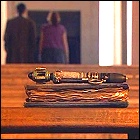 Snatched out of the TARDIS in mid-teleport, Donna finds herself in an artificial world, where she meets the man of her dreams, has children, and enjoys a normal life with no sign of the Doctor or the TARDIS…until he suddenly appears in the place of her therapist, Dr. Moon, who she seems to see quite regularly. In the library, the Doctor’s attempts to detect his shadowy adversaries are being jammed by something, somewhere, and the ranks of the expedition are dwindling as more of its crew are consumed. Only the enigmatic Professor River Song can be of any real help to him, but the Doctor is still worried about how well she knows him – especially after she whispers one word to him that proves she knows him very well, and again when she proves that she’s more than willing to sacrifice her life to save him. Donna runs into a familiar face in the virtual construct, another victim of the Vashta Nerada who clues her in to the true nature of her new life, and she begins to question everything as her artificial world starts to collapse on itself. The Doctor realizes that Donna – and almost everyone else who was in the library before the shadows fell – have been saved in the Library’s massive computer core, but as the Vashta Nerada try to claim the library world and bring it to the brink of destruction, they may not leave him enough time to recover the survivors.
Snatched out of the TARDIS in mid-teleport, Donna finds herself in an artificial world, where she meets the man of her dreams, has children, and enjoys a normal life with no sign of the Doctor or the TARDIS…until he suddenly appears in the place of her therapist, Dr. Moon, who she seems to see quite regularly. In the library, the Doctor’s attempts to detect his shadowy adversaries are being jammed by something, somewhere, and the ranks of the expedition are dwindling as more of its crew are consumed. Only the enigmatic Professor River Song can be of any real help to him, but the Doctor is still worried about how well she knows him – especially after she whispers one word to him that proves she knows him very well, and again when she proves that she’s more than willing to sacrifice her life to save him. Donna runs into a familiar face in the virtual construct, another victim of the Vashta Nerada who clues her in to the true nature of her new life, and she begins to question everything as her artificial world starts to collapse on itself. The Doctor realizes that Donna – and almost everyone else who was in the library before the shadows fell – have been saved in the Library’s massive computer core, but as the Vashta Nerada try to claim the library world and bring it to the brink of destruction, they may not leave him enough time to recover the survivors.
written by Steven Moffat
directed by Euros Lyn
music by Murray GoldCast: David Tennant (The Doctor), Catherine Tate (Donna Noble), Alex Kingston (Professor River Song), Colin Salmon (Dr. Moon), Harry Peacock (Proper Dave), Steve Pemberton (Strackman Lux), Jessika Williams (Anita), O-T Fagbenle (Other Dave), Eve Newton (The Girl), Mark Dexter (Dad), Jason Pitt (Lee), Eloise Rakic-Platt (Ella), Alex Midwood (Joshua), Talulah Riley (Miss Evangelista), Jonathan Reuben (Man)
Original Title: River’s Run
LogBook entry & review by Earl Green
Review: The second part of Steven Moffat’s creepily effective thriller does indeed pay off all of Silence In The Library‘s mysteries, even if it goes about it in a way that completely defies the viewer’s attempt to figure out what’s going on. The creepiness of the Vashta Nerada creatures – possibly the best “cheap” monster in the history of a series renowned for cheap monsters (all you have to do is position or move an extra light behind a given actor) – carries things along, and the weirdness factor is off-the-scale when the story follows Donna into a virtual world.
If there’s one plot strand that gets let down in the end, rather surprisingly, it’s River Song. Several scenes point toward River being on a much more intimate level with the Doctor than the average companion, but then the plot conveniently gets rid of her – but wait, no! False ending! Now the plot conveniently strands her – happy ending, but she’s apparently not around to return at a later date. To see the Doctor make the effort to ensure her survival, and yet trap her in the little girl’s virtual world, is a bit unsettling. River gets her happy ending, but she’s trapped. Sure, the virtual world she’s trapped in is no longer a hellish construct with creepy characters like Dr. Moon paying a visit every few minutes, but she’s still trapped there. Moffat has a habit of making sure that he doesn’t crank up the body count in his stories – witness The Doctor Dances and its “Everybody lives!” scene (directly referenced in this episode), or Blink or The Girl In The Fireplace, which only sees characters deposited in a different time or dying of old age – but it almost would’ve been more effective if River had perished. This is like a  ghoulish flipside to the ending of The Doctor’s Daughter: River is alive, in a virtual world, and she dare not manifest herself in the real world again because the Vashta Nerada will have overrun the library completely.
ghoulish flipside to the ending of The Doctor’s Daughter: River is alive, in a virtual world, and she dare not manifest herself in the real world again because the Vashta Nerada will have overrun the library completely.
Catherine Tate gets to show her dramatic chops again here, with her quickly-experienced “normal life”, but I couldn’t help but feel that she came up a little bit short when her virtual children vanished. I’m a grown man, in my 30s, with a small child (as of the time of this episode’s first broadcast), and let me tell you, even in an enclosed space with no other people around, if you turn around and the kid isn’t where you left him and you can’t immediately find him, you freak out a hell of a lot more than Donna did in that scene. Even if you’re a grown man in your 30s (which, admittedly, Donna isn’t). A nice performance, sure, but in that moment Tate didn’t convince me that the character she was playing was a parent who had just lost her children. But the remainder of the episode saw her giving one of the best straightforward dramatic readings of Donna yet. I appreciated that this element of the episode, which bears just a little bit of a resemblance to the Star Trek: The Next Generation episode Inner Light, wasn’t glossed over at the end of the show – even as they prepared to embark on their next adventure, neither the Doctor nor Donna had completely recovered from this one yet.
A very effective and creepy story, all told, but with some rather frustrating resolutions to some of its story threads. But not frustrating enough to dampen my enthusiasm for Moffat taking over as Doctor Who’s creative engine.

